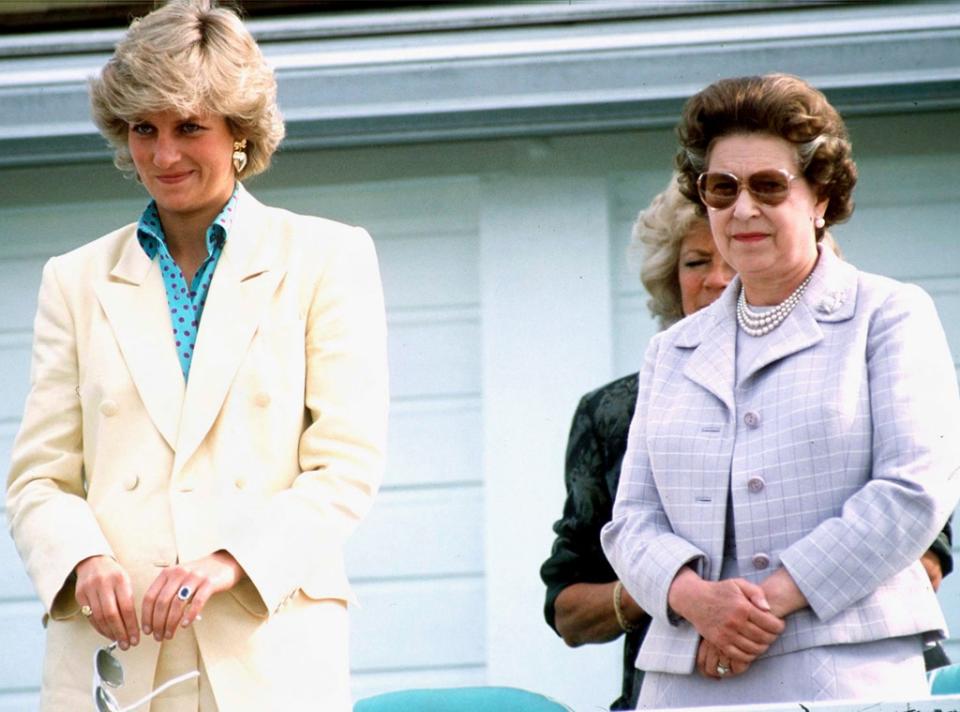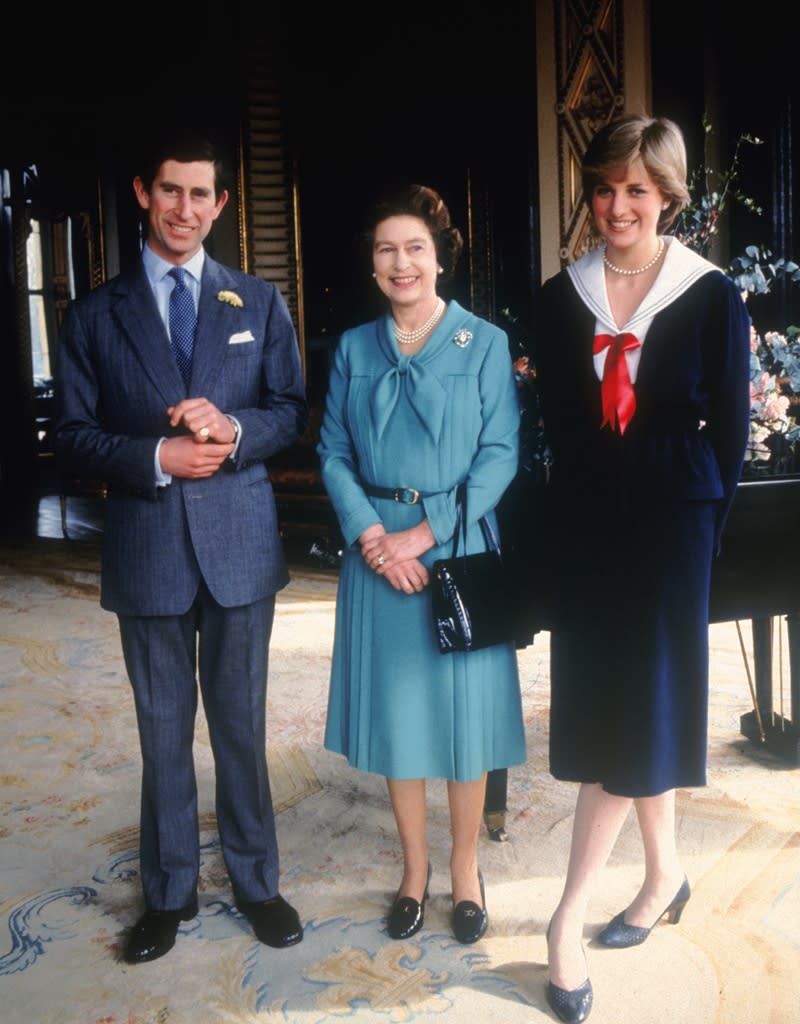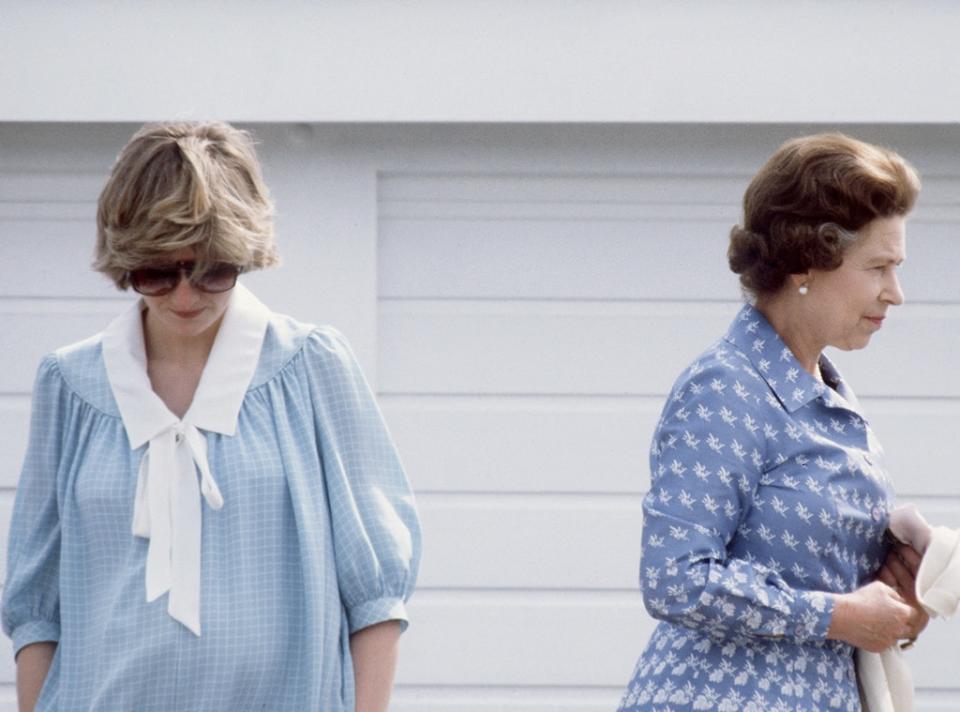Queen Elizabeth II's Complicated Relationship With Princess Diana
- Oops!Something went wrong.Please try again later.
- Oops!Something went wrong.Please try again later.
- Oops!Something went wrong.Please try again later.
So much of Queen Elizabeth II's life revolved around duty, loyalty and tradition, the choices she and other family members made dictated hardly ever dictated by their feelings in the moment, but by history.
And when it came to ensuring that the monarchy had a bountiful future, the expected outcome for her eldest son, King Charles III, was marriage.
That is, marriage to the right person, the queen having seen up close how consequential the wrong choice of mate could be to the entire family when her uncle David—King Edward VIII for less than a year—abdicated the throne so he could wed twice-divorced American Wallis Simpson. If David had married someone more suitable, he probably would've had his own kids and the line of succession would've looked much different.
And considering Elizabeth, who passed away Sept. 8 at the age of 96, nudged her younger sister, Princess Margaret, away from her preferred love once upon a time, the old-fashioned bias against divorced people didn't peter out with the Duke and Duchess of Windsor's generation.
70 Facts About Queen Elizabeth II
Lady Diana Spencer wasn't divorced. She wasn't much of anything yet, only 16 years old when Charles—who, approaching 30 and under pressure to sort out his personal life, was casually dating her sister Sarah—first noticed her.

In taped interviews that made up the meat for Andrew Morton's supposedly unauthorized 1991 biography Diana: Her True Story (reissued as Her True Story in Her Own Words after her death), Diana recalled her first impression of Charles when she saw him at Althorp, her family's Northampton estate, in 1977: "God, what a sad man."
Both of her grandmothers had served as ladies-in-waiting to Elizabeth, the Queen Mother, and Diana's father, John Spencer, was a viscount, so the family was British nobility and their social circle always included members of the royal family. Charles' much younger brothers, Prince Andrew and Prince Edward, were among Diana's childhood playmates—and she felt terrible for them. "Look at the life they have, how awful," she often thought, per Morton. Moreover, her sister Jane was married to Robert Fellowes, assistant private secretary to the queen.
As for the queen, Diana had "known her since I was tiny so it was no big deal" being around her, the "People's Princess" recalled. At least up until July 1980 when, after reuniting with Charles at the home of a mutual friend, the prince "leapt on me practically," ultimately proposing marriage on Feb. 6, 1981, after roughly seven months of sporadic dates.

Diana infamously insisted later on that she received little guidance from anyone at Buckingham Palace—not Charles, not his family, not their staff—as to what was expected of her once she got engaged, and she said the queen's office provided no help whatsoever at taming the press mob that had become obsessed with the future Princess of Wales overnight.
But in the Morton book and her infamous 1995 interview with Martin Bashir on the BBC's Panorama, Diana places the onus for her suffering on Charles, having expected to be his No. 1 priority but soon finding out that wouldn't be the case, the Prince of Wales not rising to her expectations of a devoted husband whatsoever.
In even her most rueful moments, Diana seemingly never expected much beyond what she got from her in-laws—and she never directed her ire expressly at the queen, even while recalling feeling so alone while struggling with bulimia, severe morning sickness and postpartum depression.
When she threw herself down the stairs at Sandringham while pregnant with Prince William, "the Queen comes out absolutely horrified, shaking—she was so frightened," Diana shared in the Morton tapes. Charles, she continued, "went out riding and when he came back, you know, it was just dismissal, total dismissal."
In a 2016 foreword to the 25th anniversary edition of his book, Morton wrote that Diana said "the queen" in the tapes but, when looking over the manuscript, "she altered the text and inserted the Queen Mother's name, presumably out of deference to the Sovereign."
Queen Elizabeth II's Royal Style Through the Years
A lack of respect for her mother-in-law was never an issue.
"I admire her," Diana said. "I long to get inside her mind and talk to her, and I will. I've always said to her: 'I'll never let you down but I cannot say the same for your son.' She took it quite well. She does relax with me."

From the beginning, the queen was supportive of Diana's instincts when it came to forging connections, such as when she asked the monarch's permission to represent the family at the Princess Grace of Monaco's funeral in 1982, the former Grace Kelly having been very kind to her when a newly engaged Diana first met her. Charles had predicted his mother would say no, but the queen told Diana, "I don't see why not, if you want to do this you can."
Diana also insisted there was never any argument (as rumored) with the queen over whether to take then-8-month-old Prince William with her and Charles on their tour of Australia and New Zealand. "We never even asked her," she said, "we just did it."
Diana did, however, feel hopelessly misunderstood, the queen having "indicated" to Diana that she understood the princess' bulimia to be a cause of her marital discord rather than a symptom.
By the beginning of the 1990s, when she was spilling the beans to Morton, Diana said she got on "very well" with the queen and Philip, "but I don't go out of my way to go and have tea with them."
And the queen didn't not care for Diana. More than anything she was personally scandalized by the glut of headlines about her son's marriage, enough so that Charles and Diana's separation—officially announced by Prime Minister John Major to the House of Commons in December 1992, a fitting capper to the family's storied annus horribilis.
William and Prince Harry's parents may have gone on like that forever, or at least until their kids were much older, if not for Diana's November 1995 Panorama interview, in which she lamented her "crowded" marriage of three: Charles, herself and Camilla Parker Bowles (whose divorce from Andrew Parker Bowles had been finalized that March).
Barely a month after the interview, the queen wrote to Charles and Diana that it was time to divorce. They reached a settlement in July 1996 and that was that.
When Diana was killed in a car crash in Paris on Aug. 31, 1997, the queen addressed the public with a special tribute to the "people's princess."
"I want to pay tribute to Diana myself," she said. "Diana was an exceptional and gifted human being. In good times and bad, she never lost her capacity to smile and laugh, nor to inspire others with her warmth and kindness."
For the latest breaking news updates, click here to download the E! News App

